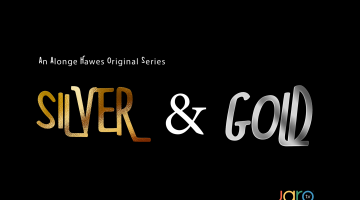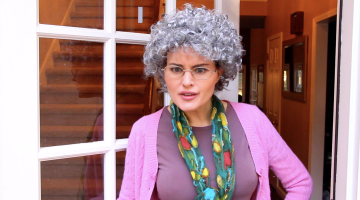It sucks to be working hard, confident you have the talent, but not have any “proof” to back that up (a sale, a job, reps, your definition of success….) You know you’re working, you know whatever you’re doing is NOT working, so you start questioning your talent:
Maybe I’m not good enough?
Maybe I should give up?
Maybe I don’t have what it takes?
If you’re reading this, you’ve considered those questions, and have not quit. Congratulations. It’s time to stop considering those questions, because they will f*ck you. No more asking if you’ve “got what it takes.” You have it. Affirm it daily by writing I’ve got what it takes on Post-its and put them on every wall in your apartment (my method) or setting a daily I’ve got what it takes reminder on your phone (the environmentally friendly method.) Do that for real, right now.
I know you didn’t do it because you’re still reading. But do it. Please. None of the rest of what you’re about to read will matter if you don’t know with certainty you have what it takes.
Down to business, here are my “Top 3 Reasons” why you’re not where you’d like to be along with their solutions, in order from most to least common:
PROBLEM 1 – Your material is not good enough, yet.
Even if you’ve been at this for a long time, your material may not be good enough, yet. Take me, Lisa Ebersole, five years ago. I thought my material was good enough. I won screenplay contests, got into UCLA’s MFA Screenwriting program, and I was a published playwright, who had written hundreds of animated educational movies for kids. I had been a professional, paid writer, for 15 years. But, I was not yet the writer of a TV series I’d written and sold and that’s what I wanted to be. If your material is not doing for you what you want it to, it is probably* not at the level it needs to be. (*see Problem 2.)
SOLUTION 1 – Stop doing what you’re doing. It’s not working.
I wrote 6 Scripts in graduate school with killer log-lines and high concept hooks that my professors and classmates also thought were hilarious and worth writing. And they could have been. The problem was, I did not know how to identify what made me a unique human being and translate that into my characters and story. So I wrote scripts that were professionally executed, fast, fun reads, but that, as one reader painfully articulated, “I loved this script, but at the end, I felt like I’d eaten cotton candy.” If there are three descriptors no one in my life will ever use to describe me, they are “fluffy, pastel-colored, cloyingly sweet.” I am the opposite of cotton candy. But that’s what I was putting out. To stop writing cotton candy, I had to overhaul my entire writing process start to finish. Over the next 3 months, I came up with a new process. It began with identifying my AUTHENTIC LENS–
My AUTHENTIC LENS is my singular point of view. Everything goes through it. It’s unique to me because it is based on my life experience. It’s the reason I know that you and I can both have the same great idea and not be in competition with each other. Our lenses are not the same and never will be.
With clients, I spend we spend a week discovering and honing their authentic lens. Here is one of the first exercises we do:
- Using a pen and paper, make a list of the 10 most painful experiences you’ve had in your life. Be specific. Write as much as you need in order to recall the pain.
- Make a list of the 10 moments in your life where you felt truly happy and carefree. Be specific. Write as much as you need in order to recall the joy.
- Make a list of 10 experiences you want to have before you die. Be specific. Where are you? Who are you with? What is this experience going to give you or change in you?
- Make a list of 10 experiences you’d like to avoid having before you die. Be specific. Where are you? Who are you with? What is it about this experience that you fear?
- Now get a different color pen. Scan the lists and circle all of the things that you DO NOT often see on screen, read in books. Those are your gold. Use them in your writing.
I tested my AUTHENTIC LENS writing my comedy series 37 PROBLEMS. I held myself to the standard that every moment be something I hadn’t seen on screen and as unique to my experience as possible. I raised the money to make 37 PROBLEMS the web series and launched it on Amazon Prime in October 2017. In July 2018, it was acquired by Elizabeth Banks’ WHOHAHA. In December 2018, it sold to Xfinity/Comcast. I’m currently developing a half hour version with an HBO Actor/Producer. I got the result I wanted. I sold a series that was authentic to me start to finish. It took finding my AUTHENTIC LENS. And many Post-its.
PROBLEM 2 – You are sabotaging your material.
It doesn’t matter how amazing your script is if you are not a human whom people want to work with. They can find a slightly less amazing script by a more appealing human. If you are something that leaves people with a negative or unsafe feeling––arrogant, super awkward, unable to make eye contact, pushy, prone to eating garlic before meetings—it’s time to change. I had a client, “Stacey,” who was “not good in a room.” Her material was awesome, but when people met her, they didn’t feel awesome. She came off as defensive and aloof. Those qualities translated to people feeling that she would be difficult to work with. So we worked on her presence. We identified how Stacey was feeling when she went into rooms––afraid, needy, expecting a “no”––and we came up with ways to get her out of those emotions/mindsets and into a place where she was excited, open to collaboration, expecting a “yes.”
SOLUTION 2 – Identify your particular set of saboteurs and come up with replacements for each.
It’s hard to do this alone. Your best bet is to work with a Peer Partner (free version) or Professional Coach (paid version) who will tell you honestly how it feels to sit across from you, and collaborate on fixes. Getting from “afraid, needy, expecting a no” to “excited, open to collaboration, expecting a yes” involves time against the problem, i.e.: as many practice meetings as you can manage, as much feedback as you can get. If you are not a sociopath, you can become “good in a room” with practice.
PROBLEM 3 – You’re actually not working hard enough.
I saved this for last because of the 100+ writers I’ve coached over the past two years, this was the problem for probably 2 of them. Most of the writers I work with are working hard. And the 2 who weren’t thought they were: Writer 1 was adamant that he was “treating screenwriting as his job.” He joined a co-working space and clocked in 8-hour days. Now, I haven’t had an office job in a while, but my last one was running a writing department at a startup. When I wanted to actually write, I worked from home. Because being in the office entailed: other writers’ questions, scheduled meetings, unscheduled meetings, IM from several countries, a very fancy coffee machine, cake for somebody’s birthday… So many distractions. So much food. I got zero writing done at “work.”
SOLUTION 3 – Write in Sessions & Track your time.
Writing Sessions can be as short as 5 min. Mine are usually 20-30. It doesn’t really matter except that for your session time, you are not allowed to do anything but write. No research, no email, no texts, no Deadline.com. Set a timer when you start and finish each writing session and keep track. At the end of the day, look at the time you actually spent writing and be real about it. I’m not saying you need to write 8 hours/day. I write 2-3 hours/day. And I do plenty of other writing-related things outside of my writing time: reading, walking, watching shows, reading other writers’ work, listening to podcasts, playing with my dog. That all counts as time well spent, but be aware of what your actual writing time is, versus what you’re telling yourself. If you’re saying, “I write 8 hours/day” and you actually write 1 hour/day? You’re not living in reality. And as much as we need to play “what if?” with stories, we need to be real about our story.
That’s it! I’ve solved all your problems! Or at least 1-3 of them. Get to work!
You can find me at lisaebersole.net and @lisaebersole on socials for questions, comments, and Coaching inquiries.














The important thing to come to terms with is that even if your putting out good content, it still may never be seen. The oversaturation of independent content online is overwelming.
Something I often like to remind people who are struggling with this is, what you are trying to do is incredibly difficult. If you wanted easy you should’ve just been a lawyer or something.
The Snobby Robot I usually just spit chewed up banana on their shirts.
Yes, it’s important to consider that the discovery of your content doesn’t have to have any relationship with it’s quality.
There are ways to get your content seen. But, it takes daily, diligent effort on social channels and strategic networking. I’m actually doing a Free Facebook Live about access this Wed at 6:30PM PT — kinda late for Europe, so my apologies on that, but tune in if you can. It’s literally called ACCESS WITHOUT AGENTS. Alex LeMay is my guest and we’ll be live for 30 min. RSVP here — https://www.facebook.com/events/297462810912726/permalink/297792160879791/?notif_t=feedback_reaction_generic¬if_id=1548714198997394